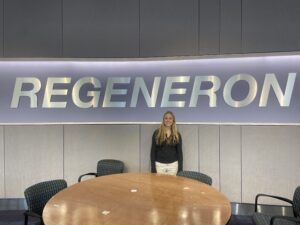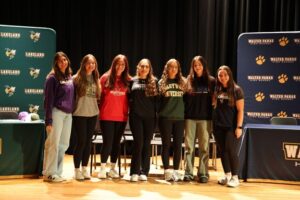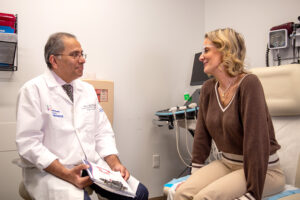Through the generous support of Regeneron, four times a year River Journal publishes the on-site report of a high school science student from the River Towns who is paired with a Regeneron scientist to experience what it is like to put STEM education to work in the real world.

Through the help of River Journal and the Ossining High School Science Research program, I had the opportunity to meet with Regeneron scientist Nicholas Giovannone, Ph.D., a principal scientist in the Regeneron Genetic Medicines group. Dr. Giovannone is currently conducting research on immune responses to gene therapy and gene editing technologies, and strategies to overcome these immune responses to enable successful treatment.
As I walked through the halls of Regeneron’s Research and Development Headquarters to Dr. Giovannone’s office and gazed into the impressive labs where countless brilliant minds were hard at work, I was inspired by the groundbreaking research that was taking place before my very eyes. When I began to talk to Giovannone about his research, my inspiration magnified.
It has always been clear to Giovannone that he was destined for a career in biology. His passion for science began in elementary school where he always paid special attention to his science classes, and continued in high school in AP Biology, when he discovered his interest in the immune system.
During high school, Dr. Giovannone worked as an intern at a lab. He became enthralled by the idea of spending his career in research. At the University of Pennsylvania, he studied immunology with vigor, and took every opportunity to be involved in lab settings, before moving onto Harvard University to obtain a Ph.D. in Immunology.
Dr. Giovannone encourages young scientists to do the same. He believes they should seize every opportunity to get into a lab setting, as an assistant, or doing real hands-on research. He claims that any lab experience is beneficial, because you are able to experience what it is actually like to be in that setting, and to find out if you have a passion for lab research. He warns young scientists that they might not love the first lab they work at, but to realize that as time goes on, they will be able to specialize in the type of lab research they are performing. He also advises rising college students to carefully consider the lab availability of the schools they are hoping to attend.
For Dr. Giovannone, the most exciting part of his career today is the intellectual challenge paired with collaborative problem solving. In the lab, each day brings an exciting new puzzle to solve and new goals to be reached.
He states that lab research is not always thought of as a collaborative field, but in reality, the work that researchers do would not be possible without the help of others. One individual person will not have every piece of the puzzle, but many hardworking minds can come together to solve an issue. He warns young students to never discount the value of communication; it is crucial to be able to talk to others about the work you’re doing and reach out to peers for help.
The biggest lesson that Dr. Giovannone has learned through his years of lab experience is that you will not solve everything right away. It is incredibly important to realize that there will be a lot of failures, and that’s part of the process. Patience is essential.
After my conversation with the brilliant Dr. Giovannone that day, I left the building feeling more excited than ever to get back to my own lab work and continue my research journey.






